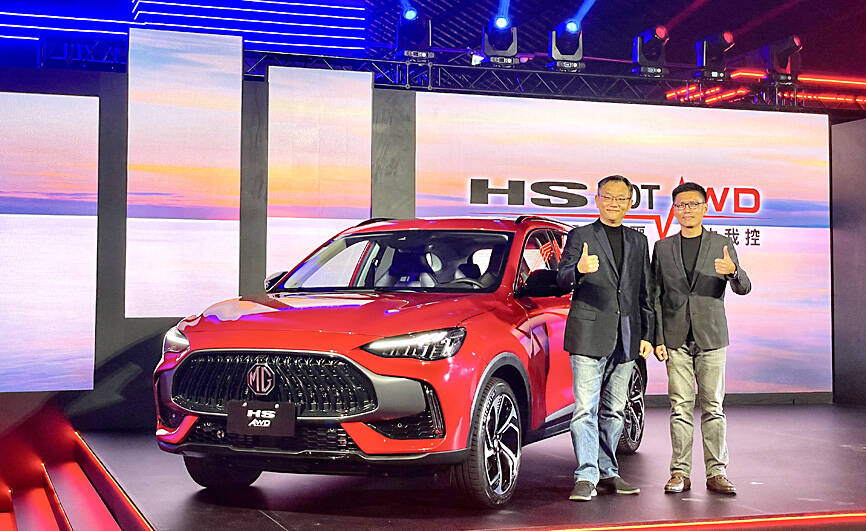China Motor Corp (中華汽車) yesterday said it has boosted the local content ratio to the required 20 percent for MG electric vehicles (EVs) developed by China’s MG Motor Co, paving the way for the popular EVs to return to the local market in the near future.
China Motor helps assemble MG EVs in Taiwan with a majority of key parts from China to save on costs, but it was forced to suspend sales of the vehicles in August after new local content regulations took effect. The firm also only accepted limited new orders for MG’s HS sport utility vehicles and ZH compact cars, citing an insufficient inventory of components.
The Ministry of Economic Affairs tightened local content regulations in August amid fear that low-cost Chinese cars would undermine the domestic auto industry. Under the new rules, automakers must have 20 percent of the components in their vehicles locally made during the first-year of sale, and see the rate increase to 30 percent in the second year and 35 percent in the third year.

Photo: Amy Yang, Taipei Times
“We are quickening our pace in boosting the local content ratio to meet the mandatory requirement in collaboration with our suppliers,” China Motor vice president Chien Ching-wu (錢經武) told investors during an online conference yesterday.
The company yesterday reported revenue expanded 16.52 percent annually to NT$32.22 billion (US$990 million) in the first nine months of the year, from NT$27.65 billion, aided by the sales of new MG cars.
Net profit plummeted 25.24 percent to NT$3.27 billion from NT$4.37 billion a year earlier, attributable to lower gains from its Chinese car business amid stiff competition and a higher comparison base last year associated with its insurance arm, Tokio Marine Newa Insurance Corp (新安東京海上產險), the firm said.
Earnings per share sank to NT$5.99 during the first nine months, from NT$8.01 in the same period last year.
The company did not offer its business outlook for next year, but said it is developing a new electric commercial car likely to be launched next year.
“The MG HS 1.5T model is the most important model among all of the MG series in the pipeline, so we will prioritize this model when applying for a local content certification. HS now contains more than 20 percent locally made parts,” Chien said.
Chien declined to confirm if the HS model is to return to the market by the end of this year, since the regulatory hurdles are almost cleared.
The company plans to raise prices for the MG cars containing more locally-made parts because of higher costs, he said.

Taiwan Semiconductor Manufacturing Co (TSMC, 台積電) yesterday said that its investment plan in Arizona is going according to schedule, following a local media report claiming that the company is planning to break ground on its third wafer fab in the US in June. In a statement, TSMC said it does not comment on market speculation, but that its investments in Arizona are proceeding well. TSMC is investing more than US$65 billion in Arizona to build three advanced wafer fabs. The first one has started production using the 4-nanometer (nm) process, while the second one would start mass production using the

When an apartment comes up for rent in Germany’s big cities, hundreds of prospective tenants often queue down the street to view it, but the acute shortage of affordable housing is getting scant attention ahead of today’s snap general election. “Housing is one of the main problems for people, but nobody talks about it, nobody takes it seriously,” said Andreas Ibel, president of Build Europe, an association representing housing developers. Migration and the sluggish economy top the list of voters’ concerns, but analysts say housing policy fails to break through as returns on investment take time to register, making the

‘SILVER LINING’: Although the news caused TSMC to fall on the local market, an analyst said that as tariffs are not set to go into effect until April, there is still time for negotiations US President Donald Trump on Tuesday said that he would likely impose tariffs on semiconductor, automobile and pharmaceutical imports of about 25 percent, with an announcement coming as soon as April 2 in a move that would represent a dramatic widening of the US leader’s trade war. “I probably will tell you that on April 2, but it’ll be in the neighborhood of 25 percent,” Trump told reporters at his Mar-a-Lago club when asked about his plan for auto tariffs. Asked about similar levies on pharmaceutical drugs and semiconductors, the president said that “it’ll be 25 percent and higher, and it’ll

CHIP BOOM: Revenue for the semiconductor industry is set to reach US$1 trillion by 2032, opening up opportunities for the chip pacakging and testing company, it said ASE Technology Holding Co (日月光投控), the world’s largest provider of outsourced semiconductor assembly and test (OSAT) services, yesterday launched a new advanced manufacturing facility in Penang, Malaysia, aiming to meet growing demand for emerging technologies such as generative artificial intelligence (AI) applications. The US$300 million facility is a critical step in expanding ASE’s global footprint, offering an alternative for customers from the US, Europe, Japan, South Korea and China to assemble and test chips outside of Taiwan amid efforts to diversify supply chains. The plant, the company’s fifth in Malaysia, is part of a strategic expansion plan that would more than triple